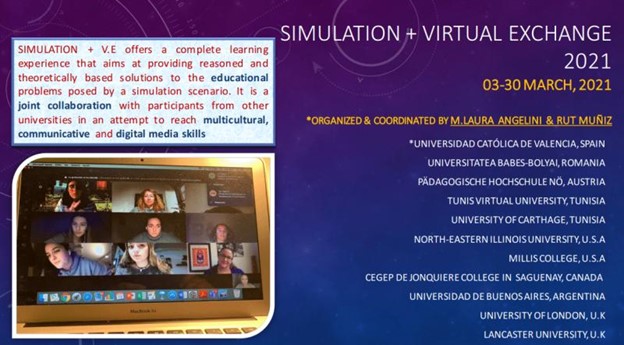These are the topics that were covered:
- Crises management and COVID and online teaching
- Literature and drama in English
- Shared teaching through lesson study
- Classroom management
- Multiple modalities in teaching
This simulation activity was very interesting for the university students because it put them into the role of teachers. They got to participate in a decision-making process, to be proactive and to apply what they had learned. While playing the role of pedagogical counsellor, I helped these future teachers arrive at a decision on how to deal with the issue presented in each of the 4 meetings we had.
I found that sharing experiences and best practices with other teachers from around the world was an innovative approach to professional development. It was interesting to talk with pre-service and newly in-service teachers and learn about the teaching contexts in their countries and classrooms. I realised that it is very much a small world, and we are not all that different after all.
Learning from simulations through international virtual exchanges
What I learned
As it turns out, I was also learning from the international participants. I learned about the Lesson Study Approach as a way for teachers to build pedagogical knowledge and improve their teaching.
It’s a cooperative teaching experience first developed in Japan. The Lesson Study Approach provides mutual support and assistance. A small team of instructors works together to design, teach, study, and refine a single class lesson. The innovative aspect of this teaching improvement strategy is that a colleague goes into the classroom to observe the students’ reactions to the teacher’s presentation of the lesson that was developed. The focus is not on the teacher but rather on the students. The observer looks at how students responded to the instruction, and how the instruction might be modified based on the evidence collected.
I believe that it is a fascinating approach to professional development.
Key takeaway: a new form of professional development
Virtual exchange activities for both students and teachers in higher education have been gaining more and more attention around the world. When I involve my students in these global learning experiences, my aim is for them to become global citizens by gaining intercultural communication skills, and by breaking down prejudices and preconceived notions about different cultural groups, countries, and societies.
I also learn from the educators I collaborate remotely with, as together we develop experiential and collaborative learning activities for our students. Virtual exchanges with international peers provide accessibility to those educators, who may not be able to travel to another country for quality international teaching development opportunities. Although virtual exchange experiences can never replace an in-person experience abroad, they have proven to be a valuable internationalization strategy that would benefit any teacher training program.


